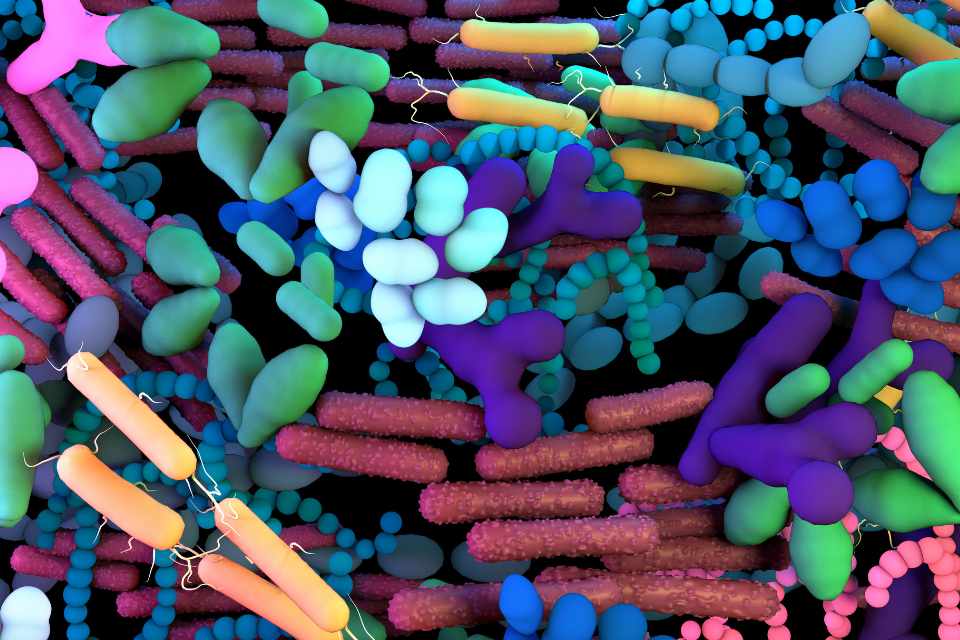Our intestines contain trillions of bacteria. In fact, far more bacteria than cells in our body. We are still learning about how these bacteria affect us. But, we do know they have a huge impact on our health and well being. As a result, probiotics and prebiotics are increasingly available as supplements. Here I explain what probiotics and prebiotics are and the difference between them.
The microbiome
Our gut microbiome comprises many different species. More species usually means a healthier gut and thus a healthier body.
Some species such as Lactobacillus and Bifidobacterium perform beneficial functions. So, we call these ‘friendly’ or ‘good’ bacteria. Other species of bacteria can cause disease. These are the so-called ‘bad’ bacteria. There are also neutral species. Neither good nor bad. But, normally present in small numbers without causing harm. However, if their numbers increase this can create an imbalance. When there is a harmful imbalance in the gut bacteria we call this dysbiosis.
Where do these bacteria come from?
During the birth process, a newborn baby is covered with bacteria. The baby swallows the bacteria and they form its gut microbiome. This microbiome matures during infancy. And a healthy and diverse microbiome can persist throughout life. But, there are many factors that influence the gut microbiome. For better or worse. Our food probably has the main influence. While a wide variety of vegetables and fruits is beneficial. A poor diet and certain medicines can reduce or eradicate bacteria.
Probiotics
Probiotics are beneficial bacteria. As we learn more about their health benefits their popularity increases. Some foods naturally contain probiotics. For example, fermented foods like yoghurt and kefir. And, fermented vegetables such as sauerkraut contain probiotics. Labels on commercial products will usually name the bacteria in the product. Regular consumption of these may enhance numbers of beneficial bacteria in the gut.
Probiotic supplements usually contain a small number of bacterial species. Perhaps even a single species. And brands may vary in quality and effectiveness.
To boost the number of good bacteria, probiotics must survive the digestive process. After all, stomach acid protects us from invasion by bacteria. The bacteria must reach the large intestine. Once there they must compete for sites with resident microbes. Competition is strong. If they can find a space they may be able to populate it and multiply. But, newly introduced probiotics often struggle to gain a foothold. Generally, they are easily eliminated. So probiotics must be regularly consumed to maintain any benefit.
Probiotic supplements are safe and can provide health benefits. For instance, they can be beneficial after a course of antibiotics, to replenish the gut microbiota. Probiotics also help to restore the balance of bacteria after a case of travellers tummy.
Prebiotics
One way to maintain a healthy gut is to boost the existing friendly bacteria. Bacteria have favourite foods too. Some foods can help beneficial species to thrive. These foods are the prebiotics. By nourishing the pre-existing good bacteria they encourage their numbers to grow. This improves the balance of gut microbes on a longer-term basis.
Prebiotics are forms of carbohydrates that resist digestion. Thus they reach the large intestine still intact. Once in the large intestine, they are fermented by gut bacteria.
Prebiotics occur in foods such as legumes, vegetables and fruits. So eating a wide variety of fruits and vegetables every day. This can help to nourish your healthy gut bacteria. Prebiotics are also available in supplement form.
In some people, prebiotics can cause problematic fermentation. Gases produced during fermentation can accumulate and cause bloating. If this happens, you may need to introduce these prebiotic foods slowly.
Probiotics and prebiotics – which is best?
Probiotics and prebiotics both have their benefits. Probiotic supplements can help boost beneficial bacteria but benefits tend to be short-lived. For longer-term benefits, I recommend including lots of prebiotic foods in the form of vegetables and fruits.
Some supplements contain both probiotics and prebiotics. That is, both the bacteria and the food it needs.
My preference is for fermented vegetables such as sauerkraut or kimchi.








0 Comments